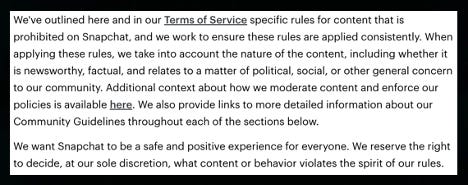The US Supreme Court 2023 Docket: Cases Affecting Social Media, Online Platforms and Crypto
Loper Bright Enterprises v. Raimondo and NetChoice, LLC v. Paxton
The beginning of October isn’t just the start of the Halloween season; it also marks the new term of the Supreme Court of the United States (SCOTUS). Legal scholars aren’t just excited for their Ruth Vader Ginsberg costumes but also the docket of cases that will be brought before the court in this session.
Specifically, there are 2 cases worth following that could impact crypto projects and online/social media platforms.
Challenging the Administrative State and “Chevron Deference”
Loper Bright Enterprises v. Raimondo – Docket No. 22-451
Loper Bright is a case concerning how much power executive agencies (think the FDA, SEC, EPA, and other acronyms) should have to regulate companies and persons that fall under their respective purview. In this case, a group of commercial fishermen disputed a rule promulgated by the Commerce Department, which compelled the fisheries to pay the salaries of the fishing inspectors required to be on their boats.
The fisheries sued the Commerce Department for exercising power beyond what was explicitly granted under the law. Specifically, the fishermen argued that the Magnuson-Stevens Fishery Conservation and Management Act of 1976 did not explicitly authorize the department to create an industry-funded monitoring system; instead, they argued the statutory language was vague.
In determining if the Commerce Department exceeded its authority, SCOTUS will consider whether to weaken or overturn a legal concept called the “Chevron Deference” or “Chevron Doctrine.” The prior SCOTUS ruling in Chevron v. Natural Resources Defense Council (1984) created a precedent concerning the judicial oversight of an agency’s interpretation of the statute it administers (e.g., the Environmental Protection Agency (EPA) administers the Clean Air Act). Under the ruling, a court is supposed to defer to an agency’s interpretation of the statute it administers when Congress’s intention of that law is ambiguous or silent -- so long as the agency’s interpretation is “reasonable.”
In certain cases, when a court is trying to determine if it should defer to the agency’s interpretation (i.e., follow Chevron Deference), it sometimes applies a legal theory called the “Major Questions Doctrine” (MQD). MQD says that if Congress did NOT give an agency explicit authority to regulate an issue involving something of major political and economic importance (aka a policy question), then the agency shouldn’t be regulating that issue (i.e., Chevron Deference shouldn’t apply). The MQD is a fairly new legal concept that got bumped to the foreground in West Virginia v. the EPA (2022), in which SCOTUS ruled the EPA wasn’t granted specific authority under the Clean Air Act to put emissions caps on carbon dioxide emissions.
The rationale is that major policy decisions should be reserved for Congress, unless a law explicitly delegates the responsibility to a federal agency with 100% certainty. In other words, an agency needs clear, Congressional authorization under a statute to regulate something. Some legal scholars critique MQD as it exists today because the level of clarity required for an agency to regulate is uncertain.
How the court ends up ruling in Loper Bright could have a direct impact on a variety of issues, including the environment, guns, the internet, disease control, among others. If SCOTUS continues to weaken the Chevron Doctrine, the authority of federal agencies could erode.
The crypto industry has been bristling against what it sees as an overzealous administrative state that is using regulation by enforcement to end crypto. Loper Bright could provide a solid ground to challenge the authority of the SEC and CFTC. Defendants in crypto enforcement cases (such as SEC v. Terraform) have attempted to use MQD as a legal argument, but the MQD defense has yet to make a significant impact. That could change after this case. Should be an interesting herring to attend!
Worth noting there are 2 additional cases challenging the “administrative state” – for folks that want to go down that rabbit hole:
· Securities and Exchange Commission v. Jarkesy (challenging administrative agency courts)
· Consumer Financial Protection Bureau v. Community Financial Services Association of America (challenging CFPB funding as violating the Constitution’s appropriations clause).
Social Media Companies’ Content Moderation Rights and Freedom of Speech
NetChoice, LLC v. Paxton – Docket No. 21-51178
Much of Silicon Valley is familiar with Section 230 of the Communications Decency Act as it’s the invincibility cloak protecting all social media and online platforms. It says, "No provider or user of an interactive computer service shall be treated as the publisher or speaker of any information provided by another information content provider." (47 U.S.C. § 230(c)(1)). In plain speak, no company that hosts user-generated content (UGC) can be held liable for that UGC.
The public policy reasoning for passing Section 230 was to let online speech flourish and thrive. By protecting the tech companies that enable UGC (such as Wikipedia, X (formerly Twitter), or Substack), you protect Internet speech by not holding a company accountable for the statements of its users.
Given the sheer amount of UGC that’s on the Internet, it would be incredibly difficult for a platform to meaningfully review every single post, blog, or message. Holding a platform liable for hosting UGC without malicious intent or knowledge could smother online discourse. Tech companies would constantly fend off lawsuits, and the Internet as we know it today might not have existed.
Note that the legal shield for hosting UGC is not absolute. Section 230 will not protect companies that violate criminal law, create harmful content, or violate a third party’s intellectual property rights. Therefore, given that there is no complete protection from a potential lawsuit, platforms want the ability to block content that could inadvertently lead them into aiding and abetting a bad actor. For example, if a user posts child pornography and the platform does nothing about it but perhaps should have known about it, it could be complicit in what is clearly an illegal activity and thereby be held liable.
Section 230 also gives online platforms the right to moderate UGC. Companies can moderate content in “good faith” that they consider “to be obscene, lewd, lascivious, filthy, excessively violent, harassing, or otherwise objectionable.” (47 U.S.C. § 230(c)(2)(A)). Without this content moderation right, tech companies would have too much litigation risk to allow anything on their platforms but puppies and rainbows, thus neutering public discourse. You could lose posts about art and politics because such subjects would be too litigious. Section 230 walks the line of trying to foster a free Internet that is a neutral place for true, dynamic discussions.
Additionally, companies also choose to moderate UGC because they worry they’ll lose advertising dollars for being seen as promoting morally repugnant views. If an online platform loses users due to another individual’s unsavory use of said platform, that could damage the company’s profitability due to the cost of litigation and revenue loss. Reduced profitability could mean the platform has to pare down its operations or shut down, thereby depriving the world of an open public square for online speech.
This brings us to NetChoice v. Paxton in which the states of Texas and Florida passed laws that restrict a company’s right to moderate content. For context, these were conservative legislatures who were concerned about left-leaning tech companies censoring conservative voices. Under the proposed laws, a user could sue online platforms for censorship and/or account suspensions, inhibiting a company’s ability to moderate UGC. The company would also need to provide an explanation for its decision to block content. The laws were reviewed by different appellate courts (the Eleventh and Fifth Circuit). There was a split between the circuits regarding the constitutionality of the laws so the Biden administration asked SCOTUS to take up the issue.
If the laws in Texas and Florida are upheld, the impact would be twofold:
Exposing Online Platforms to Legal Liability: The Texas/Florida laws could restrict the editorial discretion of tech companies to remove UGC they find to be offensive (even if such offensive content violates the terms of use) because they could be sued for censorship upon moderating content. Private companies could be compelled to host pornography, hate speech, spam and other such controversial material. That could expose tech companies to other kinds of lawsuits in which there is a risk that they could be seen as complicit in showcasing egregious content/activities as their ability to moderate has been diluted. A lose-lose scenario.
Harming a Private Company’s Freedom of Speech: Tech companies argue that if they lose the legal protection to moderate content, the government could violate a private company’s right against government-controlled speech. Forcing platforms to host speech against their will would overturn First Amendment precedent. The First Amendment is not a complete right to say whatever you want to whomever you want. Under the US Constitution, freedom of speech applies to the government curtailing free speech or compelling speech – it doesn’t mean that private parties can’t restrict speech. Next time you have trouble sleeping, read the terms of use of an online platform. You’ll notice the terms include language that reserves the right for a platform to remove UGC at its discretion. By using a platform, a user accepts those terms. As an example, below are Snapchat’s Community Guidelines (posted August 2023):
The question before the court is whether the government can restrict the speech of one party to allow the speech of another party? In this case, can the government restrict the speech of a private company (the speech in this case being content moderation) to allow users to say whatever they want?
Recall that the current court is split between 6 Republican-appointed justices (Alito, Barrett, Gorsuch, Kavanaugh, Roberts, and Thomas) and 3 Democratic-appointed justices (Kagan, Jackson, and Sotomayor), and the conservative judges have already shown in the rulings on affirmative action and abortion that they are not afraid to dismantle past legal precedents. In the American legal tradition, there is a foundational concept called “stare decisis,” which is Latin for “let the decision stand.” It means that courts should honor precedential rulings and opinions from previous case law. By respecting past decisions, the law is more consistent and predictable. While it may be frustrating that laws are slow to change, that slowness creates stability in society. Given the conservative leaning of the court, there is a good chance SCOTUS will chip away at the Chevron Doctrine and Section 230 -- two examples of settled law.
For fans of the conservative rulings -- perhaps, we shall see an uptick in the Justice Dread Pirate John Roberts this year at Halloween?
Resources:
47 U.S. Code § 230 - https://www.law.cornell.edu/uscode/text/47/230
Loper Bright Enterprises, et al., Petitioners v. Gina Raimondo, Secretary of Commerce, et al. - https://www.supremecourt.gov/docket/docketfiles/html/public/22-451.html
NetChoice, LLC, dba NetChoice, et al., Petitioners v. Ken Paxton, Attorney General of Texas - https://www.supremecourt.gov/docket/docketfiles/html/public/22-555.html
United States Courts: https://www.uscourts.gov/about-federal-courts/educational-resources/about-educational-outreach/activity-resources/supreme-1#:~:text=By%20law%2C%20the%20U.S.%20Supreme,the%20first%20Monday%20in%20October.
Congressional Research Service – The Major Questions Doctrine: https://crsreports.congress.gov/product/pdf/IF/IF12077
Congressional Research Service – Section 230: https://crsreports.congress.gov/product/pdf/R/R46751
Heritage Foundation - 3 Supreme Court Cases Could Shake Up the Administrative State: https://www.heritage.org/courts/commentary/3-supreme-court-cases-could-shake-the-administrative-state#:~:text=Now%2C%20three%20cases%20on%20the,Consumer%20Financial%20Protection%20Bureau%20v
SCOTUSblog - Justices schedule first cases of the 2023-24 term: https://www.scotusblog.com/2023/07/justices-schedule-first-cases-of-the-2023-24-term/
SCOTUSblog – Justices Take Major Florida and Texas Social Media Cases: https://www.scotusblog.com/2023/09/justices-take-major-florida-and-texas-social-media-cases/
The American Bar Association - The Major Questions Doctrine post-West Virginia v. EPA: https://www.americanbar.org/groups/environment_energy_resources/publications/trends/2022-2023/january-february-2023/the-major-questions-doctrine/
The American Bar Association - Understanding Stare Decisis: https://www.americanbar.org/groups/public_education/publications/preview_home/understand-stare-decisis/#:~:text=Stare%20Decisis%E2%80%94a%20Latin%20term,and%20opinions%20from%20prior%20cases
Electronic Frontier Foundation - Section 230: https://www.eff.org/issues/cda230
JDSupra - The First Amendment: Where it is Implicated, and Where it is Not: https://www.jdsupra.com/legalnews/the-first-amendment-where-it-is-3482126/
CNN - Biden Administration Asks Supreme Court to Hear Cases on State Social Media Laws: https://www.cnn.com/2023/08/14/business/biden-supreme-court-social-media/index.html
TechCrunch - A Law Inviting Texans to Sue Social Media Companies Over ‘Censorship’ Is Back: https://techcrunch.com/2022/05/11/texas-social-media-law-hb20/?guccounter=1
Axios – The Political Leanings of the Supreme Court Justices: https://www.axios.com/2019/06/01/supreme-court-justices-ideology
USA Today - How a Group of Herring Fishermen May Get the Supreme Court to Reel in Government Power: https://www.usatoday.com/story/news/politics/2023/05/01/supreme-court-herring-fishermen-chevron/11574448002/
Snap Community Guidelines (August 2023): https://values.snap.com/privacy/transparency/community-guidelines
Ruth “Vadar” Ginsburg generated by DreamStudio.
Dread Pirate John Roberts generated by DreamStudio.
Invisibility Cloak generated by DreamStudio.
Disclaimer: This post is for general information purposes only. It does not constitute legal advice. This post reflects the current opinions of the author(s). The opinions reflected herein are subject to change without being updated.







